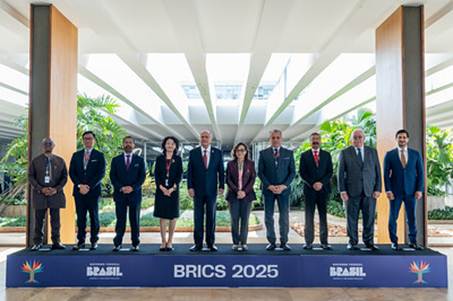India has urged the removal of export controls among BRICS member nations during the BRICS Trade Ministers’ Meeting held on May 21 in Brasilia under Brazil’s presidency. The meeting, centered around the theme “Strengthening Global South Cooperation for More Inclusive and Sustainable Governance,” served as a platform for India to advocate for enhanced intra-bloc trade cooperation and mutual support.
Looking ahead to its upcoming BRICS presidency in 2026, India praised Brazil’s pragmatic and consensus-driven approach in navigating key trade challenges and promoting constructive dialogue among member countries.
Representing India at the meeting, Economic Adviser in the Department of Commerce, Yashvir Singh emphasized the need to eliminate restrictive trade measures that disrupt critical supply chains.
A significant outcome of the meeting was the endorsement of a Joint Declaration accompanied by three annexures: the BRICS Declaration on WTO Reform and Strengthening of the Multilateral Trading System, the BRICS Data Economy Governance Understanding, and the BRICS Trade and Sustainable Development Framework. These key documents reflect BRICS’ shared commitment to an equitable, inclusive, and rules-based global trade architecture. The declaration also warned against the misuse of climate-related trade measures, cautioning that such actions should not become tools of unjustified discrimination or disguised trade restrictions.
Delivering a speech on behalf of Union Commerce and Industry Minister Shri Piyush Goyal, India extended appreciation to Brazil for steering the deliberations effectively and welcomed Indonesia’s upcoming induction into BRICS in 2025. India reiterated its call for a fair, transparent, and decentralised trade system that serves the developmental needs of the Global South.
India used the opportunity to raise the long-pending issue of WTO reform. It stressed the urgent need for a permanent solution to the matter of public stockholding (PSH) for food security and promoted its “30 for 30” proposal — a blueprint for introducing 30 practical reforms ahead of the WTO’s 30th anniversary in 2025. India also reaffirmed that sustainable development must remain a foundational pillar of international trade governance, rooted deeply in the country’s cultural ethos.
Singh also highlighted the importance of ensuring the concessional transfer of Environmentally Sound Technologies (ESTs) to developing countries, with adequate financial support. He spotlighted India’s global initiative, Mission LiFE, which advocates for mindful consumption, sustainable living, and circular economy practices as part of a fair climate responsibility model.
The meeting also acknowledged the critical role of digital transformation in global economic development. India reaffirmed its leadership in inclusive digital governance through initiatives such as Digital India and IndiaAI. It also reiterated its commitment to international collaboration in areas such as Digital Public Infrastructure (DPI), artificial intelligence, and cybersecurity. India underscored the need to continue working through multilateral forums like the Global Partnership on AI (GPAI) and the G20. The BRICS Data Economy Governance Understanding officially recognised DPI as a fundamental driver of digital economic transformation.










